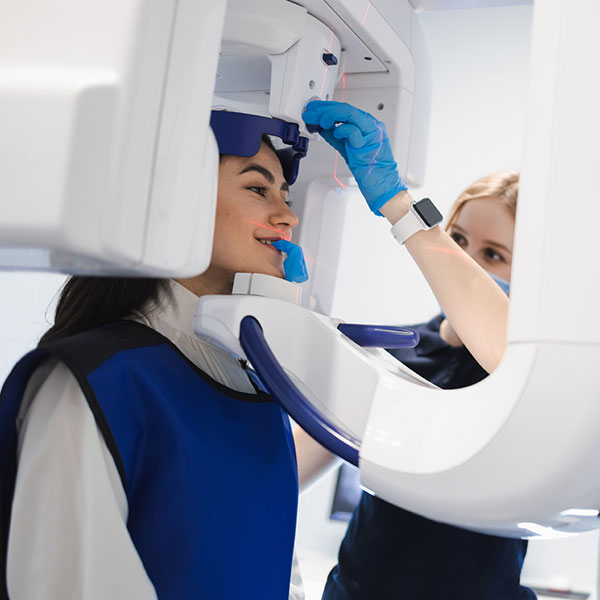Wisdom Teeth Removal NYC
Gentle Third Molar Extractions In Midtown Manhattan
Wisdom teeth removal, also known as third molar extraction, is a common surgical procedure performed to remove the third molars, commonly called wisdom teeth. These teeth typically emerge during the late teenage years or early adulthood. However, they often cause problems due to insufficient space in the mouth, improper alignment, or their tendency to become impacted (trapped beneath the gum line).
The primary purpose of wisdom teeth removal is to address potential complications and prevent oral health issues. By removing these problematic teeth, we can alleviate pain, reduce the risk of infection and inflammation, and prevent damage to adjacent teeth and surrounding structures.
5 Reasons to Remove Wisdom Teeth
- Impaction: Wisdom teeth often don’t have enough space to fully erupt properly in the mouth. When they become trapped or partially emerge through the gumline, they are considered impacted. Impacted wisdom teeth can lead to pain, infection, and other dental problems.
- Crowding: Wisdom teeth can exert pressure on adjacent teeth as they try to erupt, leading to crowding or shifting of the surrounding teeth. This can result in misalignment or orthodontic issues.
- Infection or Gum Disease: Wisdom teeth are located at the back of the mouth, which can make them difficult to clean properly. This makes them more susceptible to infection, gum disease (periodontal disease), and cavities. Infections can cause pain, swelling, and discomfort.
- Cysts or Tumors: In some cases, cysts or tumors may develop around impacted wisdom teeth. These growths can cause damage to the surrounding bone and tissue and may require surgical removal.
- Decay or Damage: Wisdom teeth are located at the back of the mouth, which can make them difficult to clean thoroughly. This can result in a higher risk of tooth decay and damage to neighboring teeth.
Fantastic experience. I had very little pain after having all 4 wisdom teeth removed (two partially impacted). Everything was explained clearly, and the entire process was smooth. Would recommend to anyone looking to get their wisdom teeth removed.
Bradley
What If I Don’t Have My Wisdom Teeth Removed As A Teenager Or Young Adult?
As wisdom teeth develop, the roots become longer and the jaw bone more dense. The longer tooth roots are often in closer approximation to the underlying nerve which can increase the risk of injury to that nerve. When it is necessary to remove impacted wisdom teeth in your thirties, forties or beyond, the post-operative course can be prolonged and there is a higher complication rate. Treating these complications is often more difficult and less predictable than with a younger patient. Healing may be slower and the chance of infection can be increased. If your impacted wisdom teeth are not removed in your teenage years or early in your twenties and they are completely impacted in bone, it may be advisable to wait until a localized problem (such as cyst formation or localized gum disease and bone loss) develops. In general, you will heal faster, more predictably and have fewer complications if treated in your teens or early twenties.
What should I expect for a Wisdom Tooth Evaluation?

The procedure begins with a thorough evaluation of your oral health, including X-rays, to determine the position and condition of your wisdom teeth. If removal is recommended, we will discuss the specifics of the procedure, addressing any concerns you may have.
What are the potential risks for Wisdom Tooth Removal?
Like all surgeries, the generalized risks are pain, swelling, infection and bleeding. Pain and swelling are usually mild to moderate with the worst being the first 48-72 hours. Most patients are out of pain or close to it by the time they return for their one week postoperative visit. Infection is unlikely, especially in young healthy patients. Bleeding usually stops within a few hours after the surgery from biting on gauze. While it is normal to have a bit of red in your saliva for a few days after the surgery, problem bleeding is exceedingly rare.
Upper wisdom teeth frequently stick up into the sinuses to some degree and in rare cases there can be a small perforation into the sinus floor. This can lead to symptoms such as stuffiness, nose bleed, sinus infection or feeling air or fluid passing between the mouth, sinus and nose.
This issue is treatable and usually resolves within 1-3 weeks and is fixable with minor surgery in the even more rare case that it does not heal on its own.
Lower wisdom teeth are close to and sometimes touching the inferior alveolar nerve, which is responsible for feeling to the lower lip, chin and jaw on either side. This nerve is for feeling only and does not move any muscles so if it is affected by the surgery the patient would feel numb or tingly in those areas but would not have any change in appearance or function. The overall incidence of nerve injury with lower wisdom teeth is 0.3% and is almost always temporary with feeling returning to normal in weeks to months. The position of the teeth to be removed in relation to the nerve is determined by xrays and in cases in which the risk is elevated a CT scan, which is a 3D xray, will be taken to further evaluate.
What is the Procedure to Remove Wisdom Teeth?
Most people prefer to be unaware of the experience when they have their wisdom teeth removed and usually decide to be sedated. You will be provided with appropriate anesthesia options at your consultation. All outpatient surgery is performed under appropriate anesthesia to maximize your comfort. Our office staff has the training, licensing, and experience to provide the various types of anesthesia. These services are provided in an environment of optimum safety, utilizing modern monitoring equipment and a well-trained experienced staff.
If you will have intravenous anesthesia, it is required that a parent or responsible adult accompanies you to the office and plans to stay with you the rest of the day. The procedure will take about 30 to 60 minutes and you will probably be in the office for 90 minutes. Recent advances in medicine and technology allow patients to undergo wisdom tooth removal in a manner which promotes rapid healing and minimal post-operative discomfort. State of the art sterilization and infection control techniques are used at all times.
If you will have intravenous anesthesia it is essential that you have nothing to eat or drink (excluding prescription medications with a sip of water) for at least 6 hours (preferably longer). This does not mean you should try to fit in one “last meal” exactly six hours before your surgery. Having anything in your stomach can increase the risk for serious anesthetic complications, including nausea and vomiting. Your procedure will be rescheduled if you have not heeded these guidelines. When you are seated in the surgical room, we will make every effort to make you as comfortable as possible. If you are going to be sedated, Dr. Hershkin will place an IV into your arm. This is a quick and nearly painless procedure that ensures optimal delivery of your medication. Local anesthesia is given to you after you are sedated to ensure comfort, and allow adequate time to travel home and rest. You will be sleepy for a significant portion of the day.
What is the Recovery Process After Wisdom Teeth Removal?

If your surgery requires stitches, these are usually the type that dissolve in 3 to 5 days and do not require removal. You may also notice a sensation of your gums feeling swollen and pulling away from your teeth. This is all part of the normal recovery, and will subside in several days.
Once the local anesthesia wears off, you may require prescription pain medication. Please try non-narcotic anti-inflammatory medications such as ibuprofen (Advil®) first, to see if that adequately treats your pain. If not, begin your other prescription pain medication. The local anesthesia may last until the following day, and should not be confused with an injury to your nerve. We recommend starting your post-operative diet with clear liquids such as jello and broths, gradually increasing in substance as your body permits.
We do not recommend using dairy products such as yogurt, ice cream or milkshakes on the day of surgery, as nausea and vomiting may develop in conjunction with the anesthetic and pain medication. If you are given antibiotics and you take birth control pills, please be aware that the birth control pills might become ineffective and take appropriate precautions.
What Does Wisdom Tooth Removal Cost And Is It Covered By Insurance?
The fee for your treatment is determined by a number of factors. These may include the difficulty involved in removing your teeth and which type of anesthesia is best for you. During your consultation appointment, the surgeon will need to review your x-rays, complete an examination and determine the best option for anesthesia, before an accurate estimate can be provided. Every insurance company has a different policy regarding the extent of coverage for a given surgical procedure. Dr. Hershkin’s office staff will help you obtain maximum insurance coverage for your treatment.